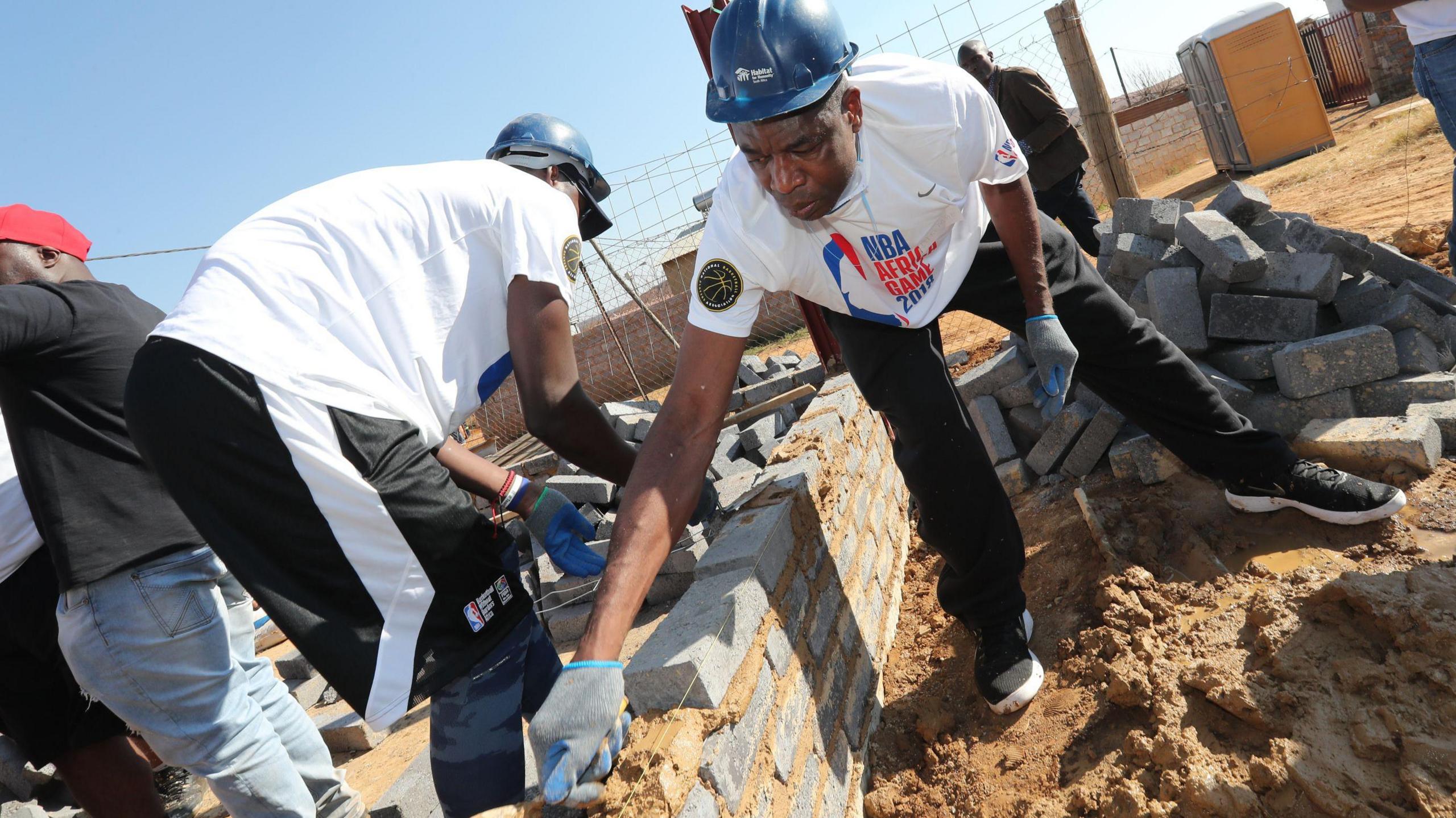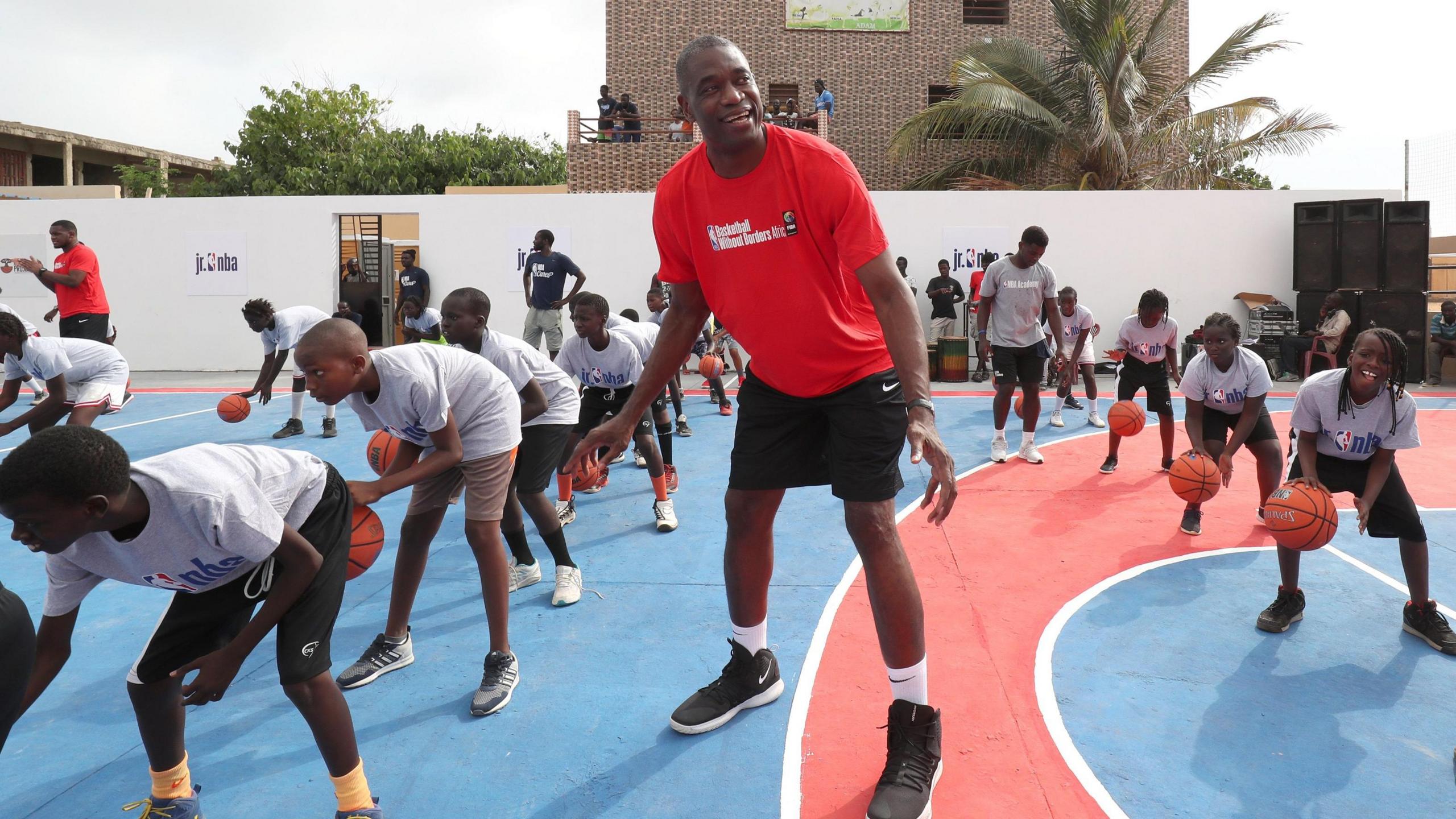A 'heart of gold' - Mutombo's humanitarian legacy
Dikembe Mutombo's finger-wagging became his trademark on-court celebration but after retiring he devoted much of his time to humanitarian causes
- Published
Former US presidents, football managers and Olympic athletes were among those paying tribute to Dikembe Mutombo following his death, hailing a man who leaves a legacy beyond the boundaries of a basketball court for those who follow in his giant footsteps.
Shortly after the announcement of the 58-year-old’s death from brain cancer on Monday, Bill Clinton, Barack Obama, Vincent Kompany and Allyson Felix all praised his kindness and humanitarian work on social media.
Clinton, who served as US President from 1993 to 2001, acclaimed Mutombo’s “unshakeable commitment to helping people everywhere”, while Bayern Munich coach Kompany described him as a “legend of the Democratic Republic of Congo” who has “inspired and given hope to an entire generation of young Congolese people all over the world”.
The tributes encapsulated the way National Basketball Association (NBA) legend Mutombo grasped the wealth and opportunities of his new home in the USA during an 18-year playing career while remaining true to his African roots and dedicating his time to helping others.
“Each one of us has a calling,” Mutombo said in 2019.
“My compassion has always been to improve the living conditions of people around the world.
“I can use my voice, my height and a little bit of my money to make the world a better place.”
NBA legend Mutombo dies from brain cancer aged 58
- Published30 September 2024
Former NBA All-Star Mutombo has brain tumour
- Published17 October 2022
With his 7ft 2in (2.18m) frame and size 22 feet, Mutombo certainly stood out and his pronounced, gravelly voice meant he was a man who demanded attention when he spoke.
Born in Kinshasa in June 1966, Mutombo moved to the United States in 1987 to study medicine at Georgetown University, but eventually switched courses to concentrate on his fledgling basketball career.
Described as a “humanitarian at his core” by NBA commissioner Adam Silver, Mutombo’s charitable work began during his playing days with the formation of the foundation bearing his name in Atlanta in 1997.
His move to the city the previous year, when he joined the Atlanta Hawks, proved to be a pivotal moment according to former Hawks general manager Pete Babcock.
“That first summer we signed him, he was buying school buses and shipping them to the Congo, and talking about how unstable the country was due to civil strife, especially the medical facilities,” Babcock told the New York Times.
Mutombo paid for uniforms and expenses for his country’s women's basketball team during the 1996 Olympic Games in Atlanta, but the main project which he helped fund was a hospital in his homeland.
He invested around $15m (£11.3m) of his own money in the $29m (£21.9m) construction and equipping of the Biamba Marie Mutombo Hospital, named after his late mother, opened in the city of his birth in 2007, while also investing in an educational institute named after his father, Samuel, in the city of Mbuji-Mayi.
A hero across Africa

Mutombo was heavily involved in Basketball Without Borders after retiring from the NBA
The Hawks were the second of six NBA teams that Mutombo represented during a career that began with the Denver Nuggets. He also played for the Philadelphia 76ers, New Jersey Nets, New York Knicks and Houston Rockets.
After retiring in 2009, he became the NBA’s first global ambassador and former US President Barack Obama said his work in the role “changed the way athletes think about their impact off the court”.
As well as projects in DR Congo, Mutombo helped fund a dormitory for an orphanage in Johannesburg, South Africa.
“There's nobody, nobody that Mutombo did not touch. Nobody,” a visibly upset Masai Ujiri, the president of the Toronto Raptors, said as he paid tribute on Monday.
“As big as he is, his heart was bigger.
“You can't imagine going to Dikembe Mutombo's village with him - the hero that he is in Kinshasa, the hero he is in Africa.”
Mutombo also held roles with the United Nations Development Programme, the Centres for Disease Control and Prevention, the international relief agency Care and the Special Olympics among others.
NBA team's tribute to Congolese star
- Attribution
- Published25 November 2015
“We'll never actually be able to measure the impact that Dikembe has had from his physical giving,” NBA Africa’s Michael Finley told BBC Sport Africa.
“Much of that he never talked about.
“He was one of those literal giants that had a heart of gold and gave with no expectations of anything in return.”
Describing Mutombo as a giant is particularly apt when thinking about his work promoting Giants of Africa, Ujiri’s basketball outreach programme designed to enrich the lives of young people on the continent – just one example of the many philanthropic organisations he supported.
Such work inspired other NBA stars with African roots to give back to their home countries and the continent.
Luol Deng, who has invested in sports facilities in South Sudan and been instrumental in the country’s male basketballers reaching the Olympics this year, hailed Mutombo as “a pioneer”.
“You gave your time, mind, and soul to those who needed it most, making you an angel on Earth, sent by God,” the former Chicago Bulls centre added in a tribute on Instagram.
“You wanted me and others to understand that going home is more important than just speaking about it.
“You had the vision to show us how we should live our lives.”
Investing in basketball's future

Mutombo held training camps for youngsters as part of his work with Basketball Without Borders, including this session in Guediawaye, Senegal, in 2019
Mutombo was involved in several schemes to boost the sport which made him famous, paying particular interest to scouting talent in Africa.
"He loved what the game could do to make a positive impact on communities,” Silver said.
In an interview in 2021, Mutombo told BBC Sport Africa there are “too many talents” on the continent, but that building more courts would unearth more players capable of reaching the top.
“I used to catch a bus for an hour and a half to get to a practice facility,” Mutombo explained.
“Now we are talking about investments coming in. People are putting practice facility in different neighbourhoods.
“Africa is a continent full of secrets, full of treasure and I think all this treasure is going to be found.”
Africa’s current batch of NBA players view Mutombo as their “godfather”, according to Finley.
For all the Congolese’s successful exploits on and off the court, he agrees with the many tributes that have singled out Mutombo’s compassion above all else.
“He was one of the kindest people you’ll ever meet,” Finley said. “He had a huge heart”.